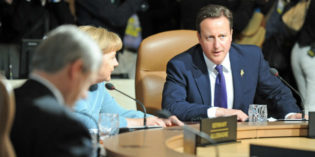Populism

Book review | Why the UK Voted for Brexit: David Cameron’s Great Miscalculation
In Why the UK Voted for Brexit: David Cameron’s Great Miscalculation, Andrew Glencross offers an analysis of Brexit. While the pace of developments since the book’s publication inevitably makes some of its observations prematurely obsolete, this remains an important and historically sensitive account of this momentous event in the domestic and international political landscape, writes Chris Moreh. […]

If you believe Brexit is a mistake, you have a democratic duty to oppose it
Is there a duty to implement the EU referendum result? Not if you believe it to be a profound mistake, argues Albert Weale. We cannot sensibly and intelligibly use the language of ‘the will of the people’ in respect of the referendum result. It is not simply a device for the registering of the preferences of […]

Lyin’, crooked, loser: how negative affective language influences people’s votes
With his frequent characterisations of his opponents as “lyin’” or “crooked”, Donald Trump’s use of language during his 2016 presidential election campaign was a departure from previous contests. In new research, Stephen M. Utych examines the effects of this sort of emotional, negative language on political decision-making. Through experimental studies, he finds that when such […]

Geert Wilders isn’t turning people against immigration – he attracts those who already opposed it
The key story in the 2017 Dutch election campaign so far has been the high levels of support for Geert Wilders’ PVV in opinion polls. But what explains the PVV’s ability to attract voters? James Dennison, Andrew Geddes and Teresa Talò argue that although Wilders’ success is frequently linked to hardening views on immigration, attitudes toward immigration […]

A right-wing populist party founded by economists: the strange case of Germany’s AfD
Alternative für Deutschland started life as a movement of economists who were opposed to the euro. Four years later and two years after they quit, it is a fully-fledged populist party. Simon Franzmann traces how the AfD acquired credibility by vaunting its economic expertise, before switching to more traditionally populist themes. Bernd Lucke with the […]

Book review | Age of Anger: A History of the Present, by Pankaj Mishra
How can we explain the apparent rise in hatred in societies around the world? In Age of Anger: A History of the Present, Pankaj Mishra offers a take on our current predicament by tracing increased disaffection, disappointment and disillusionment back through to the eighteenth century. Packed with references drawn from various disciplines and eras, this is […]

Politicians haven’t been honest with the public about immigration. They still aren’t
The populist surge that helped propel Brexit isn’t going to help the UK take control of its borders, writes Tim Bale. Neither Labour nor the Conservatives have been honest with voters about immigration policy, and that shows little signs of changing after a hard Brexit. The gap between rhetoric and reality has given politicians the opportunity to […]

Eleven ways Trump has violated democratic norms in his first month in power
Donald Trump was inaugurated on 20 January. In the past month, writes Brian Klaas, the President has already begun to erode democratic norms – and if we accept these violations as ‘the new normal’, American democracy is at risk. He sets out eleven ways in which Trump has undermined democratic institutions. Donald Trump is inaugurated on 20 […]

Fake becomes legit: social media and the rise of disinformation in democracies
Fake news is not new – Ulises Mejias identified disinformation tactics during the Russia-Ukraine conflict in 2013. It is not possible, he argues, to make a clear distinction between ‘real’ and ‘fake’ news before and after the Trump era. Journalists themselves have been complicit in creating a new media economy where survival depends on clicks. Deregulation, surveillance techniques […]



 Democratic Audit's core funding is provided by the Joseph Rowntree Charitable Trust. Additional funding is provided by the London School of Economics.
Democratic Audit's core funding is provided by the Joseph Rowntree Charitable Trust. Additional funding is provided by the London School of Economics.